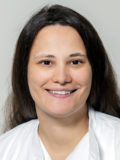Neurosciences
Main Research: Neurosciences
Term: 01.10.2022 – 31.03.2025 (bonus time until 30.09.2025)
Reactive carbonyl species (RCS) are linked to development of metabolic syndrome including neuropathic pain and fatty liver disease (MAFLD), but the possibly synergistic role of RCS in both conditions remains to be investigated. This project aims at analyzing RCS as biomarkers in neuropathic pain patients with or without concomitant MAFLD, with parallelncomprehensive experimental neurophysiological examinations of patients and assessment of functional effects of RCS on sensory neurons in vitro.
Dr. Margareta Miriam Düll
Medizinische Klinik 1
- E-Mail: miriam.duell@uk-erlangen.de
Main Research: Neurosciences
Term: 01.01.2024 – 30.06.2026
The aim of this project is to facilitate the understanding of the role of extracellular vesicles (EVs) in the development and progression of Parkinson’s disease (PD). EVs extracted from blood of PD patients and controls will be fractionated according to cellular origin and cargo profiling will be performed focusing on pathogenic forms of aSyn and regulatory RNAs. The results will offer deeper insights in PD-related signatures, and permit exploring the origin and transfer of pathogenic molecules.
Dr. Fanni Annamaria Boros
Molekular-Neurologische Abteilung
Main Research: Neurosciences
Term: 01.10.2024 – 31.12.2026
We aim to develop a voxelomic atlas of the brain. We will leverage high-resolution, multi-spectral ex-vivo imaging data from Magnetic Resonance Imaging (MRI) in combination with deep learning techniques, to compare single-voxel data between individuals. The atlas will serve as a tool to interpret single-voxel neuroanatomical variability. The project will build on preliminary work in sample preparation and data processing techniques.
Dr. Alexander German
Molekular-Neurologische Abteilung
- E-Mail: alexander.german@uk-erlangen.de
Main Research: Neurosciences
Term: 01.06.2024 – 30.11.2026
Loss of spatacsin protein leads to the development of SPG11-HSP disorder. It has a rapid progression and exhibits various neurological symptoms, like Parkinsonism, and is characterized by dysregulated glycosphingolipid metabolism. The research examines the connection between SPG11 depletion, lysosomal glycosphingolipid degradation pathway and protein aggregation.
Dr. Daniil Kachkin
Stammzellbiologische Abteilung
- E-Mail: daniil.kachkin@uk-erlangen.de




